Lucrul cu tinerii poate fi și mobil – Youthwork can ”Be Mobile”
[RO] 2023 a fost la fel de plin de activități, poate chiar mai plin decât anii anteriori pentru că am avut multe mâini harnice care au făcut ca Tinemobilul să poată merge mai des, mai mult și mai departe.
Din iunie încoace activitățile Tinemobilului au continuat sprijinite de echipe de voluntari locali și internaționali din țări precum Franța, Portugalia, Spania, Italia, Croația, Georgia, Bulgaria, România și implementate în cadrul proiectului ”Be Mobile” proiect coordonat de partenerii noștri letoni BAZE. A fost o vară și o toamnă plină-plină.
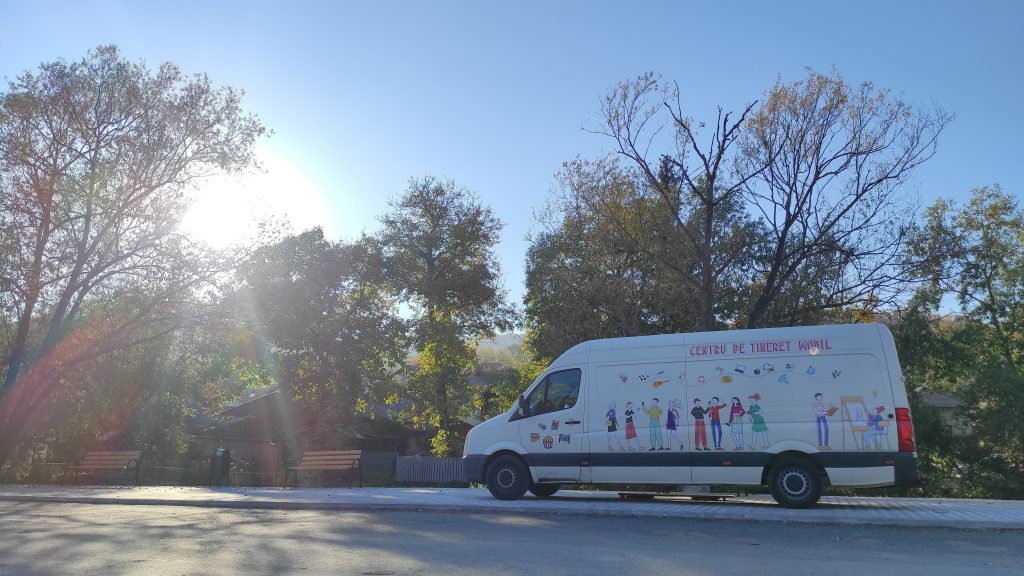
În 2023 Tinemobilul a vizitat 7 sate din zonă aducând peste 60 de activități și peste 20 de proiecții de film însumând mai mult de 160 de ore petrecute cu peste 200 de copii și tineri, la care se adaugă mai mult de 60 de ore petrecute pe drumuri și ulițe și peste 80 de ore petrecute planificând și pregătind toate aceste activități.
Cu ajutorul programului Erasmus+ Tinemobilul nu doar că și-a întârtit roțile pe prin satele vecine ci a devenit și internațional găzduind vizita partenerilor letoni de la centrele BAZE și Merkis și a dat șansa colegilor noștri să viziteze la rândul lor cele două centre din Letonia.
Ne apropiem de finalul proiectului moment în care vom împărtăși metodele noastre de lucru, experiența, ideile și sugestiile și toate învățămintele adunate în cadrul acestui proiect de la toate cele 4 organizații implicate.
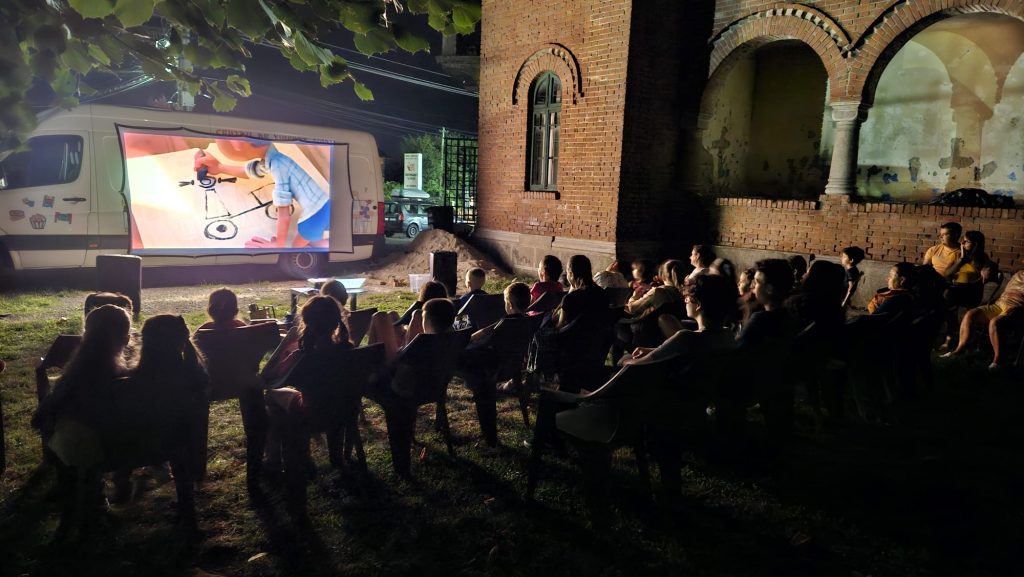
[EN] 2023 was just as full of activities, maybe even fuller than previous years because we had many industrious hands that made Tinemobilul go more often, more and further.
From June onwards Tinemobilul activities continued supported by teams of local and international volunteers from countries such as France, Portugal, Spain, Italy, Croatia, Georgia, Bulgaria, Romania and implemented within the “Be Mobile” project coordinated by our Latvian partners BAZE. It has been a busy summer and autumn.
In 2023 the Tinemobilul visited 7 villages in the area bringing over 60 activities and over 20 film screenings totalling more than 160 hours spent with over 200 children and young people, plus more than 60 hours spent on the roads and lanes and over 80 hours spent planning and preparing all these activities.
With the help of the Erasmus+ programme Tinemobilul not only delayed its wheels in the neighbouring villages but also became international by hosting the visit of the Latvian partners from the BAZE and Merkis centres and gave the chance to our colleagues to visit the two centres in Latvia as well.
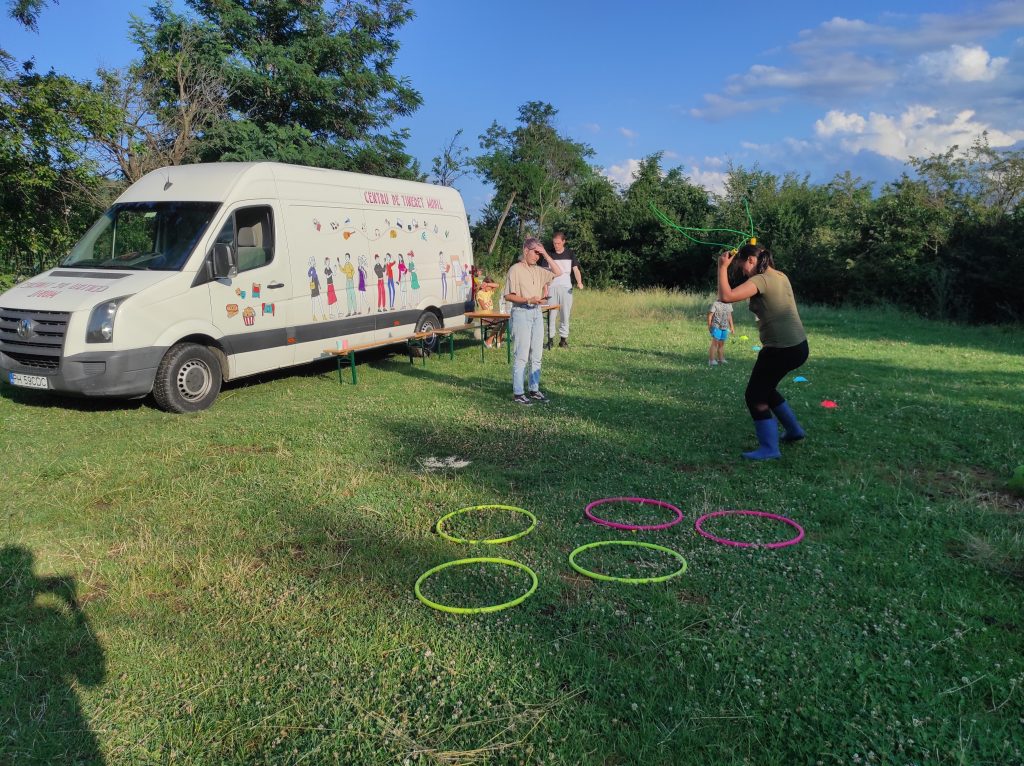
We are approaching the end of the project when we will share our working methods, experience, ideas and suggestions and all the learnings gathered during this project from all the 4 organisations involved.
===
Proiectul ”Be Mobile” (2022-1-LV02-KA210-YOU-000084078) este un proiect cofinanțat prin programul Erasmus+ al Uniunii Europene și are ca scop îmbunătățirea modului de lucru cu tinerii și popularizarea lucrului cu tinerii detașat.
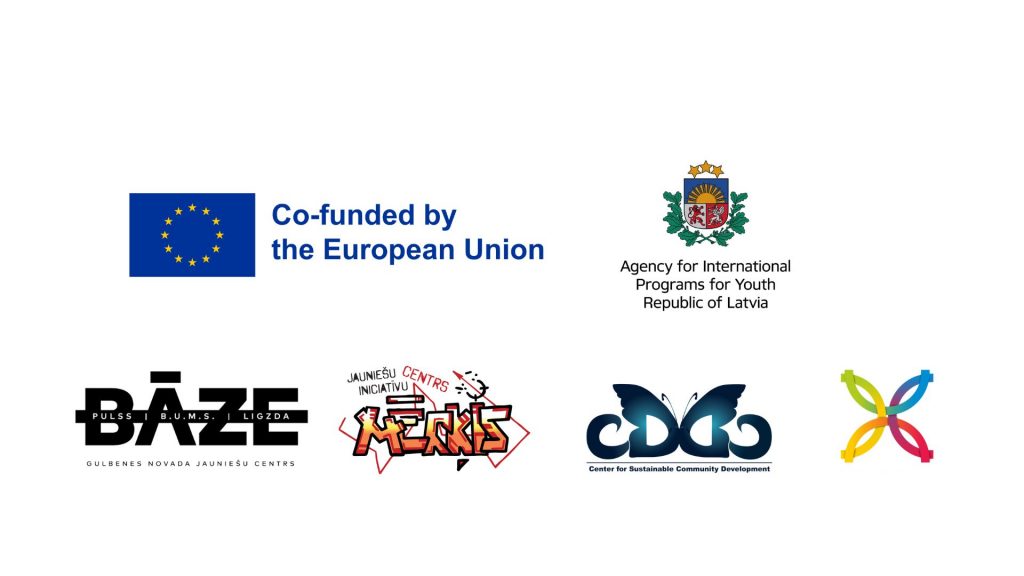
Lucrul cu tinerii detașat – Mobile Youthwork
[RO] La Curba de Cultură ne dorim să ajungem la cât mai mulți tineri din zonele rurale ale județului Prahova, să ne extindem dincolo de Izvoarele, Măneciu, Vălenii de Munte. Și deși centrele noastre de tineret (din Izvoarele și Măneciu) sunt deschise tuturor tinerilor, nu întotdeauna le este accesibil și ușor să ajungă la noi. Fie că nu au timp, fie că nu exista microbuz sau tren să îi aducă ori să îi ducă acasă seara, ori că nu își permit un bilet de tren sau autobuz de câteva ori pe săptămână.
Astfel, încă de când am deschis centrul de tineret de la Izvoarele, mulți dintre tineri ne-au spus să își doresc o Curba de Cultură la ei în sat. Și ne-am tot frământat cum să facem să ducem Curba la ei în sat. Ideea a venit în 2016, din păcate implementarea a fost posibilă doar în 2020 (unul din puținele lucruri pozitive aduse de pandemie). Am pus pe roate Tinemobilul în 2020, un Volkswagen Crafter ce obișnuia să care marfă a devenit centru de tineret mobil și cum nu e a lui Batman să fie Batmobilul, ci a tinerilor, e Tinemobilul.
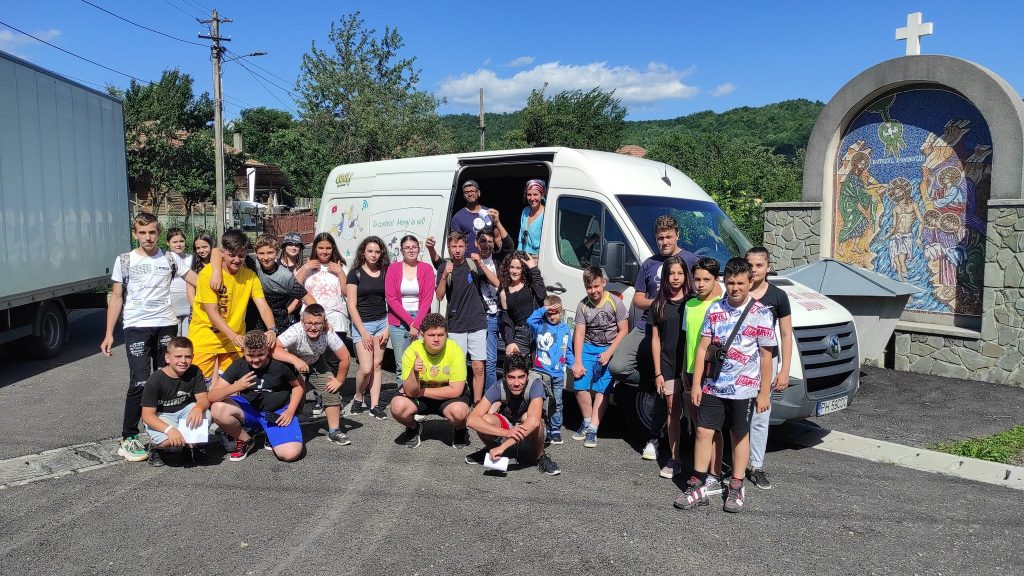
Din 2020 si până în 2023 Tinemobilul a fost plimbat prin satele din zonă (Slon, Cerașu, Măgurele, Iazu, Bughea de Sus, Teișani, Olteni, Ștubeiu, Homorâciu, Cernești, Izvoarele, Măneciu și Cheia) cu ajutorul tinerilor implicați ca voluntari locali, și cu a voluntarilor internaționali veniți din țări precum Franța, Spania, Portugalia, Cehia, Polonia, Malta, Italia, Bulgaria, Georgia, Estonia, Turcia și care au organizat activități sportive, competiții de PlayStation, proiecții de film, activități artistice, discuții și dezbateri chiar mici ateliere de gătit.
Însă nu ne-am oprit aici cu internaționalizarea Tinemobilului și pe lângă vizite în Bulgaria pentru un schimb de tineri și în Germania la Festivalul Centrelor de Tineret Mobile (da, există și un astfel de festival, la prima ediție ce-i drept) am decis să colaborăm cu partenerii noștri din Letonia pentru un proiect de extindere a activităților de tineret și să învățam unii de la alții. Astfel că în 2023 și puțin din 2024 punem în aplicare proiectul ”Be Mobile” un proiect ce aduce impreună 4 organizații implicate și interesate de lucrul cu tinerii detașat/ mobil, și anume Centrul de Tineret BAZE și Centrul de Tineret Sigulda ambele din Letonia și Centrul pentru Dezvoltare Comunitară Durabilă și Curba de Cultură, ambele din România.
Astfel, am planificat vizite reciproce în cele două țări pentru a înțelege modul de lucru și contextul cultural și socio-politic în care activează fiecare organizație, vom crea o serie de activități de implementat cu tinerii dar și materiale de lucru, precum și o serie de întâlniri online și ateliere pentru a de îmbunătăți modul de lucru cu tinerii în zone îndepărtate, acolo unde aceștia nu au acces la un centru de tineret zilnic.
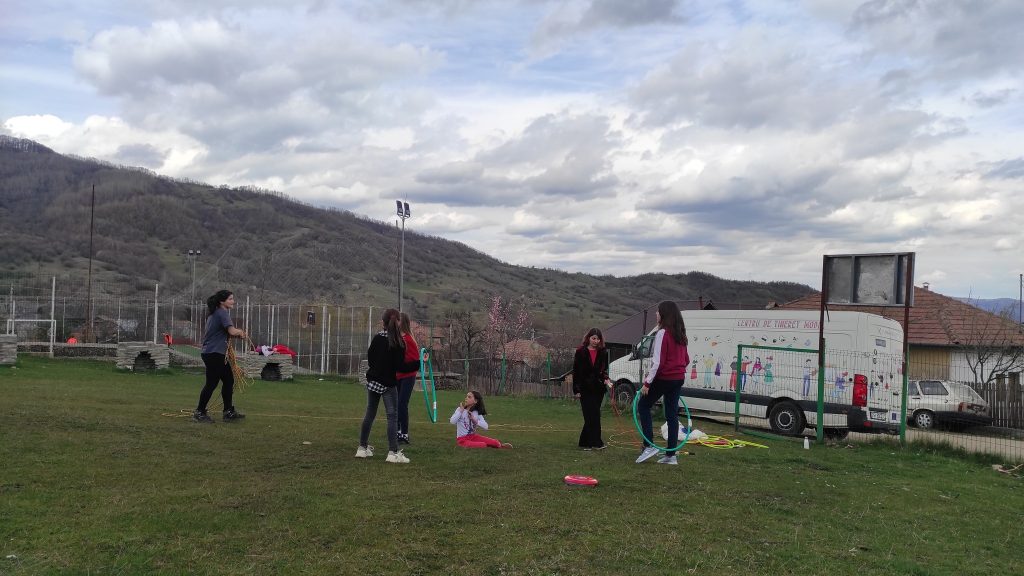
Țineți aproape, că vom prezenta mai multe din cadrul proiectului pe paginile noastre de social media și aici pe site, căci ne dorim ca și alte organizații să preia acest model și să îl adapteze și utilizeze în comunitățile lor. Toți tinerii merită să fie sprijiniți și să aibă oportunități de dezvoltare personală.
[EN] At Curba de Cultura we want to reach as many young people as possible from the rural areas of Prahova county, to expand beyond Izvoarele, Măneciu, Vălenii de Munte. And although our youth centres (in Izvoarele and Măneciu) are open to all young people, it is not always accessible and easy for them to reach us. Either they don’t have time, or there is no minibus or train to bring them or take them home in the evening, or they can’t afford a train or bus ticket a few times a week.
So, ever since we opened the youth centre in Izvoarele, many of the young people have told us that they want a Curba de Cultură in their village. And we’ve been thinking about how to get the Curba to their village. The idea came in 2016, unfortunately the implementation was only possible in 2020 (one of the few positive things brought by the pandemic). We got Tinemobilul rolling in 2020, a Volkswagen Crafter that used to carry cargo became a mobile youth center and since it’s not Batman’s to be the Batmobile, it’s the youth’s, it’s the Tinemobile (tineret = youth).
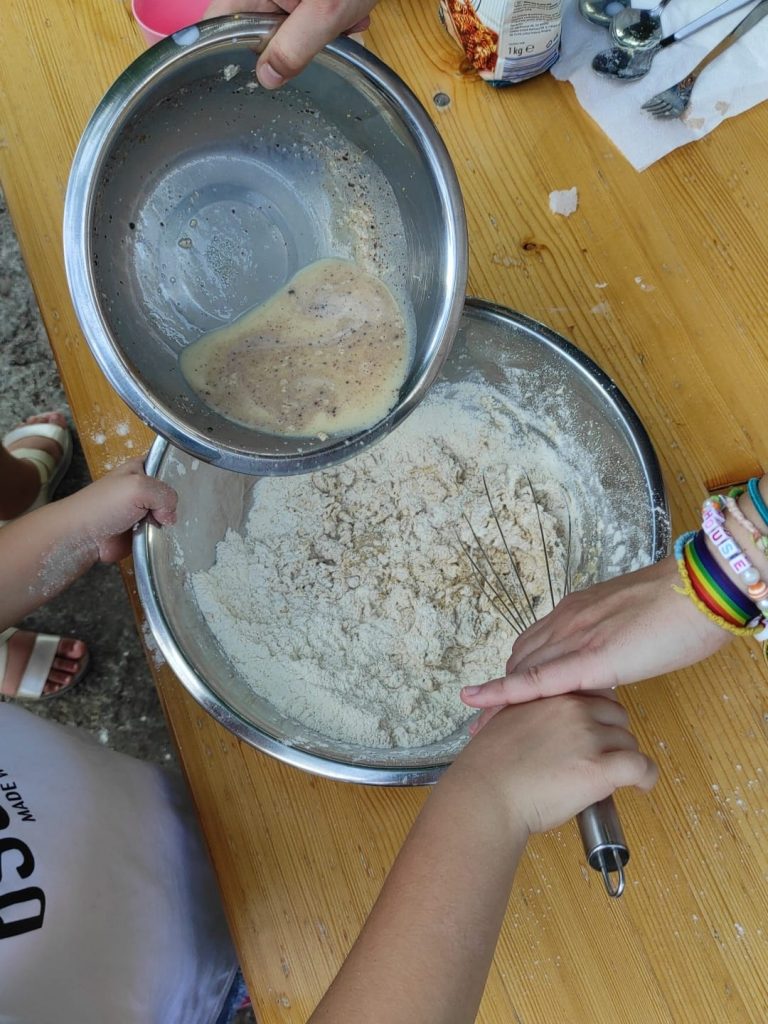
From 2020 to 2023 the Tinemobilul was driven through the villages of the area (Slon, Cerașu, Măgurele, Iazu, Bughea de Sus, Teișani, Olteni, Ștubeiu, Homorâciu, Cernești, Izvoarele, Măneciu and Cheia) with the help of young people involved as local volunteers, and international volunteers from countries such as France, Spain, Portugal, Czech Republic, Poland, Malta, Italy, Bulgaria, Georgia, Estonia, Turkey, who organised sports activities, PlayStation competitions, film screenings, artistic activities, discussions and debates, and even small cooking workshops.
But we didn’t stop there with the internationalisation of Tinemobilul and besides visiting Bulgaria for a youth exchnage and Germany for the Mobile Youth Centre Festival (yes, there is such a festival, in its first edition) we decided to work with our partners in Latvia on a project to expand youth activities and learn from each other. So in 2023 and a little in 2024 we will implement the project “Be Mobile” a project that brings together 4 organizations involved and interested in working with posted/mobile youth, namely BAZE Youth Centre and Sigulda Youth Centre both from Latvia and Centre for Sustainable Community Development and Curba de Cultură, both from Romania.
Thus, we have planned reciprocal visits to the two countries to understand the way of working and the cultural and socio-political context in which each organisation operates, we will create a series of activities to implement with young people as well as working materials and a series of online meetings and workshops to improve the way of working with young people in remote areas where they do not have access to a youth centre on a daily basis.
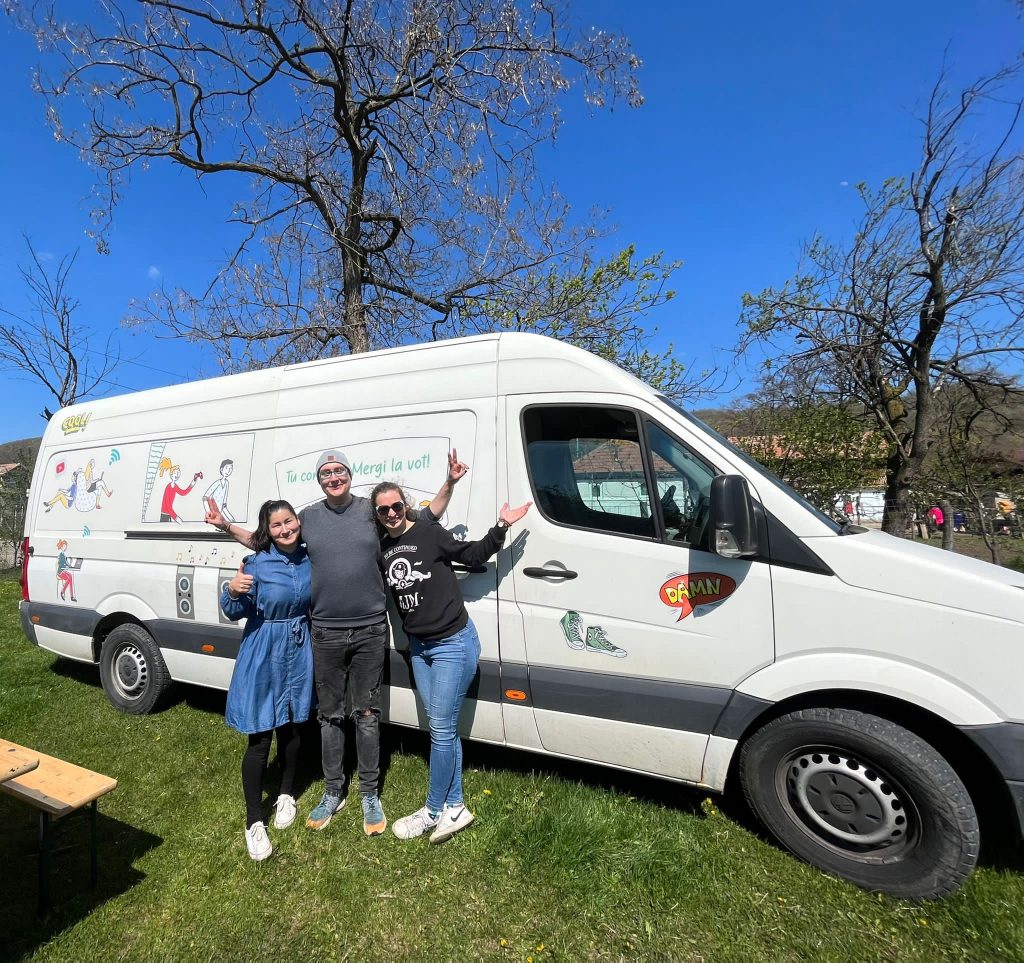
Stay tuned, as we will be featuring more from the project on our social media pages and here on the website, as we want other organisations to take up this model and adapt and use it in their communities. All young people deserve support and opportunities for personal development.
===
Proiectul ”Be Mobile” (2022-1-LV02-KA210-YOU-000084078) este un proiect cofinanțat prin programul Erasmus+ al Uniunii Europene și are ca scop îmbunătățirea modului de lucru cu tinerii și popularizarea lucrului cu tinerii detașat.

Call for Slovenian, Portuguese, German and Estonian volunteers
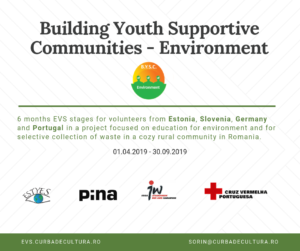
Curba de Cultură is looking for one volunteer from any of the following countries: Slovenia, Germany, Portugal or Estonia for a six months EVS in Izvoarele, a nice and cozy Romanian village.
Curba de Cultură focuses on teenagers and youth development. Our mission is to use non-formal education as a complementary method to the formal educational system for young people. We want to create the premises for a better development of the young people and their more suited integration within their respective communities. We want to make young people aware that they actively belong to their local and national culture.
We are looking for an 18-30 years old volunteer who has:
- motivation to live and work in rural area for 6 months
- motivation to work with youngsters and children
- motivation to do international volunteering
- basic knowledge of English both in writing and speaking
- interest in learning a different European language
The activities the volunteers would do, as part of the team, are:
- interactive activities, lectures, presentations, simulation games, role-plays with children and youngsters in the schools
- visits with pupils to the landfill and selective waste collection centre
- designing with students selective waste trash cans for classrooms
- preparations of the materials for the cans
- assembling and decorating the cans together with students
- organizing treasure hunts and other intercultural events
- writing blogposts and articles
- creating a brochure of the project
- attending trainings (education for environment, event management etc)
- preparing a dissemination event to be done after return to home country
Being an Erasmus+ project the volunteers receive:
- accommodation in a traditional Romanian house (but with wi-fi :P)
- pocket money and budget for food
- bus permits for local transport
- phone sim cards and monthly credit for it
- international travel costs up to 275 EUR for Slovenia, Estonia, Germany and Portugal reimbursed in the end of the stay
- Romanian language classes
- mentor support for personal development and personal learning plans
- coordinator support for implementing activities
- complete medical insurance through Cigna Insurrance Plan
- Youthpass certificate
- two international trainings provided by the Romanian National Agency
- internal trainings according to the topics of the project
- smiles and hugs 😉
Other details about the project:
- Name: Building Youth Supportive Communities – Environment
- Length: 6 months, starting ASAP and until end of September 2019
- Location: Izvoarele, Prahova County, Romania (the historical region of Walachia)
- Hosting/ Coordinating Organization: Curba de Cultură
- Sending organizations: Cruz Vermelha Braga (Portugal), PINA (Slovenia), Estyes (Estonia) and Jugendwerk de AWO – Karlsruhe (Germany)
If we caught your attention send us a CV and motivation letter asap at sorin@curbadecultura.ro
Also if you want to know more do not hesitate to ask using the same e-mail.
P.S. Explore this webpage to find out more about the community, the work and the volunteers we host.
Portret de voluntar – Tim (Portugalia)
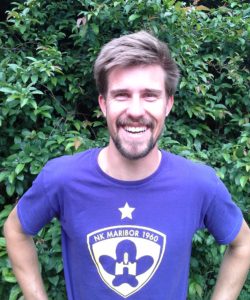 Boas! I’m 24 years old, I’m from the lovely Portuguese coastal city of Aveiro, and my name is Tim. You may think that this is not a very Portuguese name, and well, you’re right: my parents immigrated from Germany almost 30 years ago. Besides some travelling and a year of Erasmus exchange in Slovenia, I spent all my life in Portugal. There, I studied chemical engineering, finishing my master degree last year and working (very briefly) as a production engineer.
Boas! I’m 24 years old, I’m from the lovely Portuguese coastal city of Aveiro, and my name is Tim. You may think that this is not a very Portuguese name, and well, you’re right: my parents immigrated from Germany almost 30 years ago. Besides some travelling and a year of Erasmus exchange in Slovenia, I spent all my life in Portugal. There, I studied chemical engineering, finishing my master degree last year and working (very briefly) as a production engineer.
But something was missing.
I felt the weight of not having a concrete aim after leaving the university, and I was unable to build up enough motivation to work in a factory, producing some random goods that neither make people happier nor turn the world into a better place.
So, when the opportunity arose to be part of an environmental education project at Curba de Cultură, it didn’t take me long to pack my stuff and move further east than I’ve ever been before.
Besides some reforestation journeys back home, I have never really volunteered, and the only work with children I have done so far were some gymnastics lessons. So yes, I’m pretty much out of my comfort zone. And that’s great. It means that there is a lot for me to learn.
I love sports of almost any kind, and I already had the chance to practice a bunch of them, my latest passion being tennis. I’m also fond of everything that involves nature and being outdoor, such as hiking, cycling and gardening.
Sal’tare! Am 24 de ani, vin din adorabilul oraș Aveiro de pe coasta Portugaliei și mă numesc Tim. Probabil credeți că ăsta nu e un nume foarte portughez, ei bine, aveți dreptate: părinții mei au emigrat din Germania cu 30 de ani în urmă. Înafară de câteva călătorii și un an de studii Erasmus în Slovenia, mi-am petrecut restul vieții în Portugalia. Acolo am studiat Chimie Industrială, am terminat masteratul anul trecut și am lucrat (puțin) ca inginer de producție.
Dar ceva lipsea.
Am simțit apăsarea faptului că nu aveam un scop precis după terminarea facultății și nu eram capabil să mă motivez suficient cât să lucrez într-o fabrică, făcând niște obiecte care nu fac oamenii fericiți și nici nu fac lumea mai bună.
Prin urmare când a apărut ocazia de a deveni parte a unui proiect de educație pentru mediu la Curba de Cultură, nu mi-a luat mult să îmi împachetez lucrurile și să mă mut mai la est decât am fost vreodată.
Înafară de câteva acțiuni de împădurire, nu am făcut voluntariat, și singura muncă pe care am făcut-o cu copii au fost orele de gimnastică. Da, sunt înafara zonei mele de confort și asta e minunat. Și mai înseamnă că există multe pe care pot să le învăț.
Iubesc sporturile de orice fel și am avut șansa să practic câteva dintre ele, dar cea mai recentă pasiune a mea este tenisul. De asemenea orice implică natura și statul afară mă încântă, precum drumețiile, ciclismul și grădinăritul.
Tim este în România pentru o perioadă de șapte luni, din mai 2018 până în noiembrie 2018, în cadrul proiectului Building Youth supportive Communities – Environment [2017-2-RO01-KA105-037748] proiect co-finanțat de Uniunea Europeană prin Programul Erasmus+ și implementat în România de către Curba de Cultură.
Portret de voluntar – Anna (Polonia)
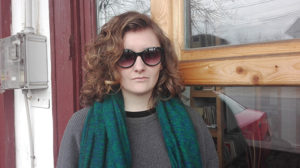 My name is Anna, I’m 28 years old and I come from Poland. For long time after I graduated from University ( pedagogy, social rehabilitation) I have worked with youth and children from dysfunctional families. I have also been a volunteer and coordinator in many projects in polish drug rehabilitation centres, which was a great practice for me. After years living in Poland I was tired and bored of the reality, so I decided to do something different. And that is how I ended up in EVS in Romania. I didn’t know much about this country, but I was very hungry for knowledge and new experiences. My first associations with Romania? Dracula (!), Transylvania and…Cristian Mungiu. The more I started to read about this country, the more I realized how fascinating this place is and how rich is a culture and the nature of Romania. I hope I will explore as much as it is possible. I also hope to improve my English, learn a little bit of Romanian and least, but not last to gain new professional experience, working with teenagers from different nationality than my own.
My name is Anna, I’m 28 years old and I come from Poland. For long time after I graduated from University ( pedagogy, social rehabilitation) I have worked with youth and children from dysfunctional families. I have also been a volunteer and coordinator in many projects in polish drug rehabilitation centres, which was a great practice for me. After years living in Poland I was tired and bored of the reality, so I decided to do something different. And that is how I ended up in EVS in Romania. I didn’t know much about this country, but I was very hungry for knowledge and new experiences. My first associations with Romania? Dracula (!), Transylvania and…Cristian Mungiu. The more I started to read about this country, the more I realized how fascinating this place is and how rich is a culture and the nature of Romania. I hope I will explore as much as it is possible. I also hope to improve my English, learn a little bit of Romanian and least, but not last to gain new professional experience, working with teenagers from different nationality than my own.
Privately I am very open-minded person, I love to meet new people, travel and discover beauty in every, even not so obvious places. I also love to read books, going to the cinema and especially to the theatre, which is my new passion. I would like to see some plays here also. I will do everything I can to spend an inspiring and productive time here. And come back with thousand of great memories and photos.
Numele meu este Anna, am 28 de ani și vin din Polonia. Pentru o bună bucată de vreme, după ce am terminat facultatea (pedagogie, reabilitare socială) am lucrat cu tineri și copii care proveneau din familii disfuncționale. Am fost voluntar și coordonator în proiecte desfășurate de centre de reabilitare poloneze, lucru care a constituit o bună practică. După atâția ani de trăit în Polonia am obosit și m-am plictisit de cotidian, prin urmare am decis să fac ceva diferit. Și așa am ajuns în acest SEV în România. Nu știam prea multe despre țara asta, dar sunt dornică de noi cunopștințe și experiențe. Ce îmi vine în minte legat de România? Dracula (!) Transilvania și… Cristian Mungiu. Cu cât citesc mai mult despre țara asta, cu atât mai mult descopăr căt de fascinant e acest loc și ce cultură și natură bigată are România. Sper să pot explora cât mai mult. De asemenea sper să îmi îmbunătățesc engleza, să învăț ceva română și nu în ultimul rând să acumulez experiență profesională muncind cu tineri de o altă naționalitate decât a mea.
Înafară de asta sunt o persoană deschisă, îmi place să întâlnesc noi oameni, să călătoresc și să descopăr frumusețe orice locuri, chiar și în cele mai puțin evidente. De asemenea iubesc să citesc, să merg la film și teatru, astea sunt pasiunile mele. Mi-ar place să văd niște piese și aici. Voi face tot posibilul sp am parte de un timp productiv și inspirațional. Și să mă întorc cu mii de amintiri și fotografii.
Anna este în România pentru o perioadă de șase luni, din martie 2018 până în august 2018, în cadrul proiectului Active Youth in Rural Settings [2017-1-PL01-KA105-035693] proiect co-finanțat de Uniunea Europeană prin Programul Erasmus+ și implementat în România de către Curba de Cultură.
Portret de Voluntar – Adrianna (Polonia)
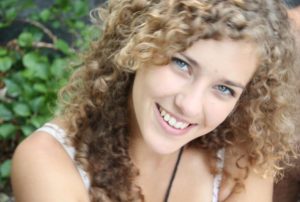 Salut! I’m Adrianna and I’m 24 years old. I come from Poland but for the past 6 years I’ve been living in all kinds of different parts of the world. Throughout my nomad life I went to American High School, studied in the UK, did courses and internships in Vienna, Singapore, London, and Edinburgh, and most recently spent 3 months volunteering in Ghana. So of course I love travelling, learning about different cultures and ways of living, and getting to know people. But my main interest is in dance – I have a Bachelor’s degree in Dance and Culture and I’ve explored many different forms of movement – contemporary dance, contact improvisation, African contemporary, Kathak (traditional Indian dance), yoga, and others. I’m passionate about exploring how movement reflects on the culture, dancing with people, and being creative whilst moving. I have other passions too – reading books, going on nature trails, trying new food (!), listening to good music, and engaging in all kinds of story telling and discussions,
Salut! I’m Adrianna and I’m 24 years old. I come from Poland but for the past 6 years I’ve been living in all kinds of different parts of the world. Throughout my nomad life I went to American High School, studied in the UK, did courses and internships in Vienna, Singapore, London, and Edinburgh, and most recently spent 3 months volunteering in Ghana. So of course I love travelling, learning about different cultures and ways of living, and getting to know people. But my main interest is in dance – I have a Bachelor’s degree in Dance and Culture and I’ve explored many different forms of movement – contemporary dance, contact improvisation, African contemporary, Kathak (traditional Indian dance), yoga, and others. I’m passionate about exploring how movement reflects on the culture, dancing with people, and being creative whilst moving. I have other passions too – reading books, going on nature trails, trying new food (!), listening to good music, and engaging in all kinds of story telling and discussions,
Saying that, my experience is a wild mix of different adventures – I have worked as assistant producer, choreographed my own pieces, co-directed a student dance company, danced with mixed-ability youth, and co-led scout troupe in Poland and teams of volunteers in Singapore and Ghana.
Now EVS in Curba de Cultura is my next adventure. I’m looking forward to learning about the Romanian culture, getting to know people, and exploring the beauty of this country (I’ve done some hikes already so I know that it is very beautiful here!). I’ll be looking out for opportunities to share and exchange ideas, movements and be creative together.
Salut! Eu sunt Adrianna, am 24 de ani și sunt din Polonia, dar în ultimii 6 ani am locuit în diferite părți ale lumii. În viața asta nomadă a mea am fost la liceu în America, am studiat în Regatul Unit, am urmat diferite cursuri în Viena, Singapore, Londra și Edinburgh, iar recent am făcut 3 luni de voluntariat in Ghana. Prin urmare iubesc să călătoresc, să învăț despre alte culturi și alte moduri de viață și să cunoasc oameni. Dar principalul meu interes este dansul – am o licență în Dans și Cultură și am explorat diferite tipuri de mișcare, de la dans contemporan, improvization contact, dans african contemporan, Kathak (dans tradițional indian), yoga și multe altele. Îmi place să explorez modul în care mișcarea reflectă cultura, modul în care oamenii dansează și cum să fii creativ în timp ce te miști. De asemenea sunt pasionată de lectură, plimbări în natură, să încerc noi feluri de mâncare, să ascult muzică bună și să mă implic în discuții și povești.
Prin urmare experiența mea este un amestec de aventuri – am lucrat ca asistent producător, mi-am coregrafiat propriile piese, am co-regizat un grup de dans studențesc, am dansat cu tineri cu diferite abilități și am condus un grup de cercetași în Polonia și o echipă de voluntari în Singapore și Ghana.
Acum un stagiu SEV la Curba de Cultură este noua mea aventură. Sunt curioasă să aflu mai multe despre cultura românească, să cunosc oameni și să explorez această țară frumoasă (am făcut deja scurte drumeții și știu că e frumos aici). De asemenea voi profita de șansele care apar pentru a împărtăși și schimba idei de mișcare și pentru a fi creativi împreună.
Adrianna este în România pentru o perioadă de șase luni, din martie 2018 până în august 2018, în cadrul proiectului Active Youth in Rural Settings [2017-1-PL01-KA105-035693] proiect co-finanțat de Uniunea Europeană prin Programul Erasmus+ și implementat în România de către Curba de Cultură.
Maestra focului în Homorâciu
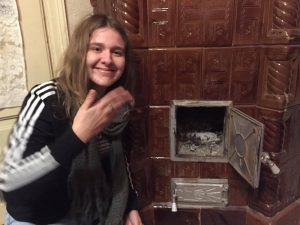
Growing up, I never had to make a fire. When I came to Romania, (Sat Homoraciu) I knew that this would change. Here there are ovens, and in the winter it is necessary to make a fire, otherwise we would freeze to death. In order to avoid this, one day Sorin, accompanied by Gabriel, came to the Homorâciu house to show us how to make one. After he showed us, he asked who wants to try. I felt nervous and confused because I have never ever tried to make it before. It was a challenge for me but when I managed to make the first spark it was a life changing experience. From then on, every night when it was cold, I made a fire in Heloise’s and my room and sometimes also in Stefanie’s and Martina’s room, and sometimes even also in the living AND bathroom. Soon I was known by the name of fire-master. I was so good, that in every corner of the house it was warm when I made the fire. The wood and the flames were listening to me and I could control them with a gasp. One day however I understood that this talent was given by the heaven and it’s unfair that not everybody has this gift. So I decided to share my knowledge so that everybody can make a perfect fire. Here are the eight steps:
Până acum nu a fost nevoie să fac foc. Când am venit în România (în satul Homorâciu) am știut că asta se va schimba. Aici sunt sobe, iar iarna e nevoie să facem foc, altfel înghețăm. Pentru a evita asta într-o zi Sorin a venit împreună cu Gabriel la casa noastră din Homorâciu să ne arate cum să facem foc. După ce ne-a arătat ne-a cerut să încercăm și noi. Mă simțeam emoționată și dezorientată căci nu mai făcusem așa ceva înainte. A fost o provocare pentru mine, dar când am reușit să scot primele scântei a fost o experiență ce mi-a schimbat viața. Din acel moment, în fiecare seară când a fost frig am făcut foc în camera mea și a lui Heloise și câteodată în camera Martinei și a lui Stefanie și câteodată în camera de zi și în baie. În curând am devenit cunoscută sub numele de Maestra Focului. Sunt atât de pricepută și devine cald în fiecare colț al casei atunci când fac eu focul. Se pare că lemnul și flăcările mă ascultă și le pot controla cu o suflare. Astfel am înțeles că acest talent mi-a fost dat din ceruri și este foarte incorect că nu toți îl au. Dar am decis să îmi împărtășesc experiența astfel încât toată lumea să poată face un foc perfect. Aceștia sunt cei opt pași de urmat:
- Prepare dry paper and 3 small pieces of wood.
- Pregătește hârtie uscată și bucăți mici de lemn.
- Arrange the three pieces of wood in a “tipi” form and place the crumpled papers in between the woods.
- Aranjează bucățile de lemn în formă de con și pune hârtia mototolită între bucățile de lemn.
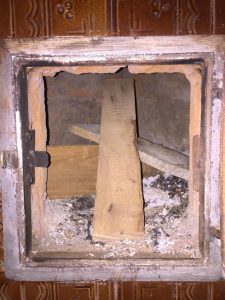
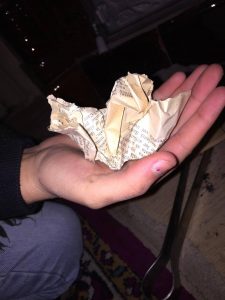
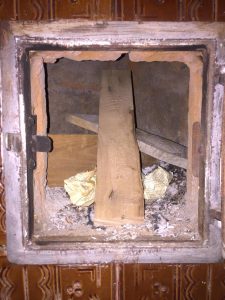
- Take new crumpled paper, light it with a lighter, and put it under the tipi.
- Ia o altă bucată de hârtie mototolită, aprinde-o și pune-o sunt lemne.
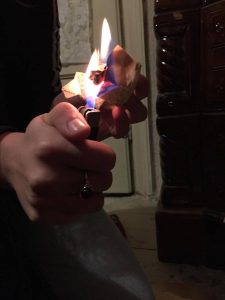
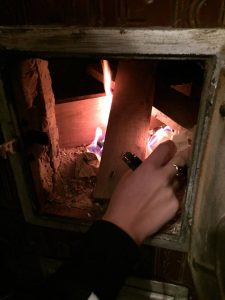
- Add more and more paper until you see that the woods caught a stable fire.
- Mai adaugă nișt bucăți de hârtie până vezi că s-a aprins focul s-a aprins bine.
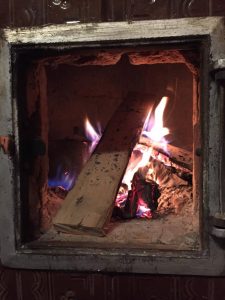
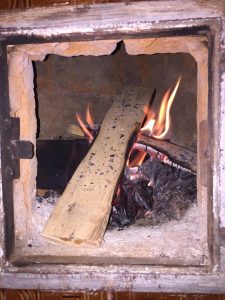
- Place a big piece of wood on top and let it catch flames from the smaller woods.
- Pune o bucată mai mare de lemn de asupra și lasă-o să se aprindă de la cele mici care ard.
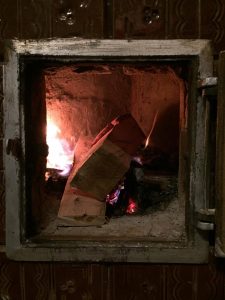
- If you see that the fire is a little bit disappearing you can try to talk to the fire and use your strong breath to make it light it up again.
- Dacă vezi că focul începe să dispară încearcă să-i vorbești și să sufli un pic în el să îl faci să se aprindă din nou.
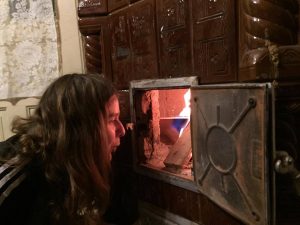
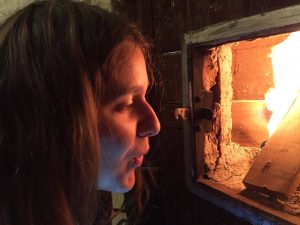
- Finally if you see that the fire is burning nicely, you can add more bigger woods.
- Când vezi că focul are frumos, mai adaugă niște bucăți de lemn.
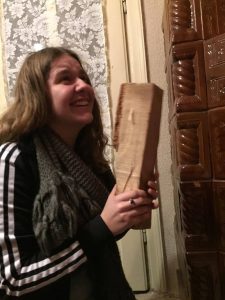
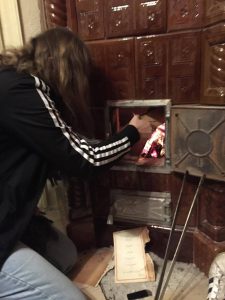
- Now you close the door, make a tea, eat some biscuits or cake or what you find in your kitchen, put your feet on the table and just enjoy your time.
- Acum închide ușa sobei, fă-ți un ceai, mânâncă niște biscuiți sau prăjitură sau ce găsești prin bucătărie, pune-ți picioarele pe masă și simte-te bine.
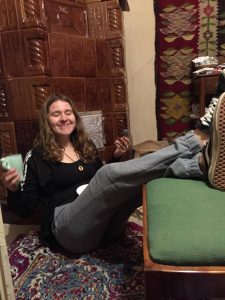
Melanie se află în România pentru o perioadă de 6 luni, din septembrie 2017 până în Februarie 2018 în cadrul proiectului Behind Borders (ref nr 2017-2-BE05-KA105-002181), proiect co-finanțat de Uniunea Europeană prin Programul Erasmus+ și implementat în România de Asociația Curba de Cultură.
Tradiții, obiceiuri și limbi diferite
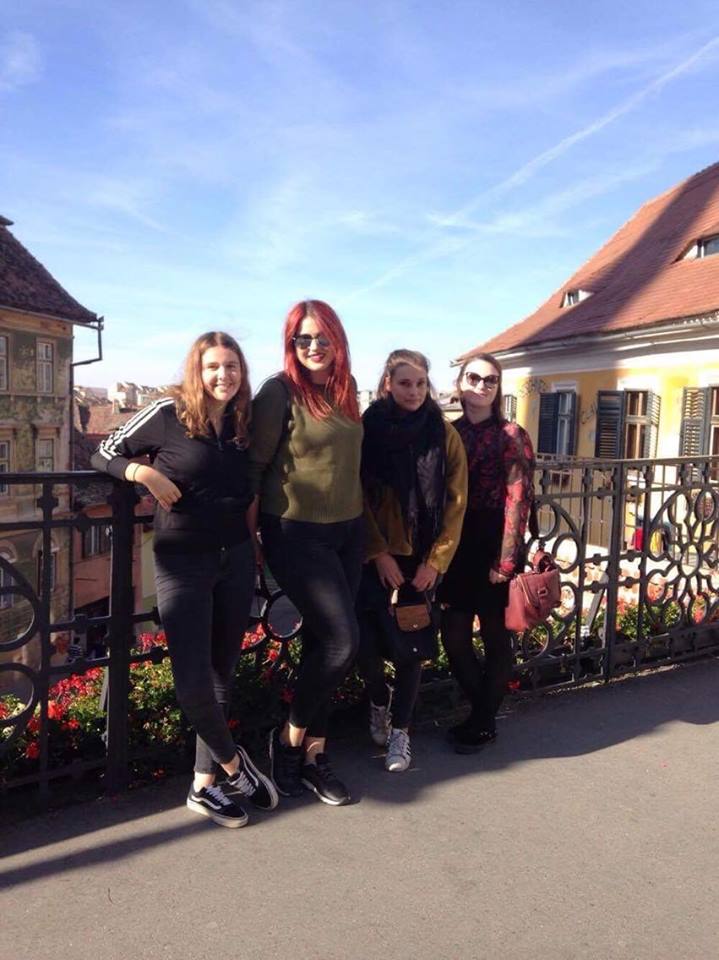 E normal ca atunci când mergi în străinătate să vorbești o altă limbă, să vezi alte culturi și alte tradiții. De când am sosit în România, vorbesc în engleză zilnic. Pe lângă asta am observat diferite alte curlturi, no doar cea românească, ci și a altor țări deoarece în biroul nostru lucrează oameni din zece țări, ceea ce înseamnă zece culturi diferite, zece tradiții și obiceiuri diferite.
E normal ca atunci când mergi în străinătate să vorbești o altă limbă, să vezi alte culturi și alte tradiții. De când am sosit în România, vorbesc în engleză zilnic. Pe lângă asta am observat diferite alte curlturi, no doar cea românească, ci și a altor țări deoarece în biroul nostru lucrează oameni din zece țări, ceea ce înseamnă zece culturi diferite, zece tradiții și obiceiuri diferite.
It’s normal when you go abroad that you will speak another language, see other cultures and traditions. Since I came to Romania I use English every day. Also I saw different cultures, not just the Romanian, other countries’ cultures as well. In our office work people from ten different countries, which means ten different cultures, ten different traditions and habits.
Să lucrez cu oameni de diferite feluri nu a fost niciodată o problemă, dar să împart camera și casa cu oameni necunoscuți, asta e ceva diferit. Să muncești și să locuiești, practic să îți petreci timpul cu oameni pe care nu îi știai dinainte și cu care nu vorbești limba maternă, este ceva nou și ceva cu care trebuie să te obișnuiești în SEV. Eu împart casa cu oameni din trei alte țări, toți avem obiceiurile noastre, felul nostru de a face lucruri. Dar găsim adesea lucruri în comun și ne bucurăm de timpul petrecut împreună, învățând unii de la alții. Împărtășim experiențele pe care le-am avut, gătim feluri tradiționale și încercăm unele noi, chiar dacă sunt neobișnuite.
Working with different type of people was never a problem, but sharing your room, your house with unknown people is a little bit different. Working and living, and spending your days with people you didn’t know before, and you can’t speak the same language, is something new for everyone and also something you need to get used to in EVS. I share the house with people from three different countries, we all have our own habits, our own way to do things. We also find some common things and we enjoy to spend time together, learning from each other. We enjoy sharing our experiences, cooking our traditional meals and trying new ones, even if some meals are unusual for us.
Cele mai amuzante momente rămân totuși cele în care nu știm anumite cuvinte în engleză și încercăm să le explicăm în limbile materne, sperând că vor fi similare sau la fel în engleză. Chiar dacă suntem diferiți am venit aici pentru același lucru, să ne descoperim și să îi descoperim pe ceilalți și să ne bucurăm de compania reciprocă.
The funniest moments come when we don’t know some word in English and we are trying to explain what we want to say and we say it in our languages, hopping that is similar or the same in English. Even if we are all different we came here for the same thing to discover ourselves and the others and we enjoy each other’s company.
Martina se află în România pentru o perioadă de 6 luni, din septembrie 2017 până în Februarie 2018 în cadrul proiectului Volunteer to Grow (ref nr 2017-1-HR01-KA105-035177), proiect co-finanțat de Uniunea Europeană prin Programul Erasmus+ și implementat în România de Asociația Curba de Cultură.
Hugs and flowers (about teaching in Romania) – Flori și îmbrățișări (despre predat în România)
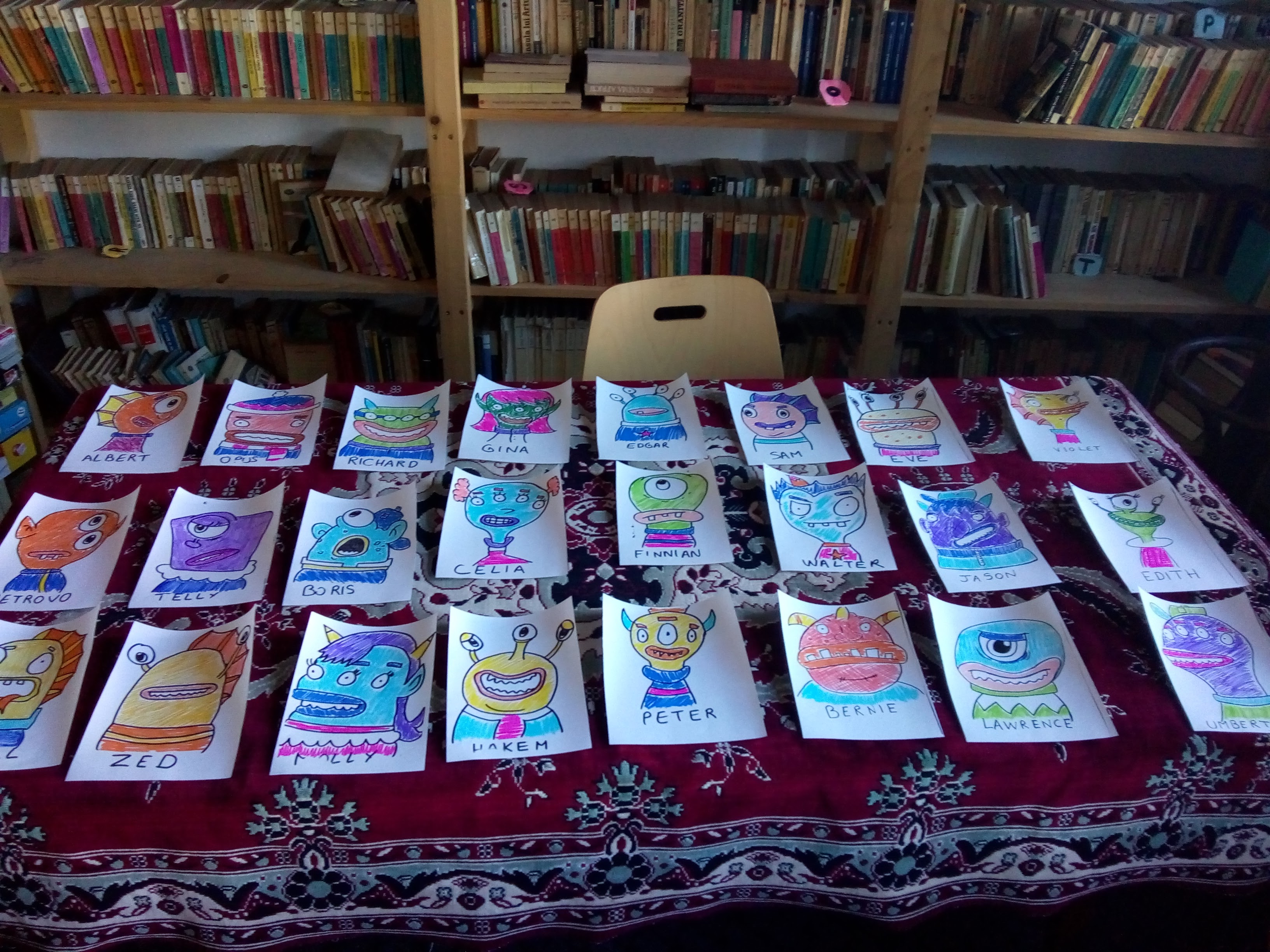 Every Wednesday, a little before two, I pack my bag with flashcards, pens, games and flipcharts. I take a short walk from Curba to the Cultural Center in Izvoarele, I move a few chairs and tables around, set my things up, and I take a minute to remind myself of my plan for the day.
Every Wednesday, a little before two, I pack my bag with flashcards, pens, games and flipcharts. I take a short walk from Curba to the Cultural Center in Izvoarele, I move a few chairs and tables around, set my things up, and I take a minute to remind myself of my plan for the day.
When two strikes, I start to see small (and not so small) figures wrapped in layers of warm clothes running from the school to their English lesson. They all gather around me in the hall and try really hard not to speak Romanian when they want to say hi and see how I’m doing. Anyway, they look much less confused when I speak English than I do when I hear Romanian! We then spend an hour learning English together with games and activities that are meant to help the participants improve their speaking and comprehension skills.
I’m always impressed by how much effort and consideration they put in during the time we spend together. So, no matter how badly my day may have been going before, when I leave the lesson, I’m always in the best of moods. Whether I get flowers, positive feedback or just lots of hugs, these little marks of gratitude make me so happy to be a teacher in Romania!
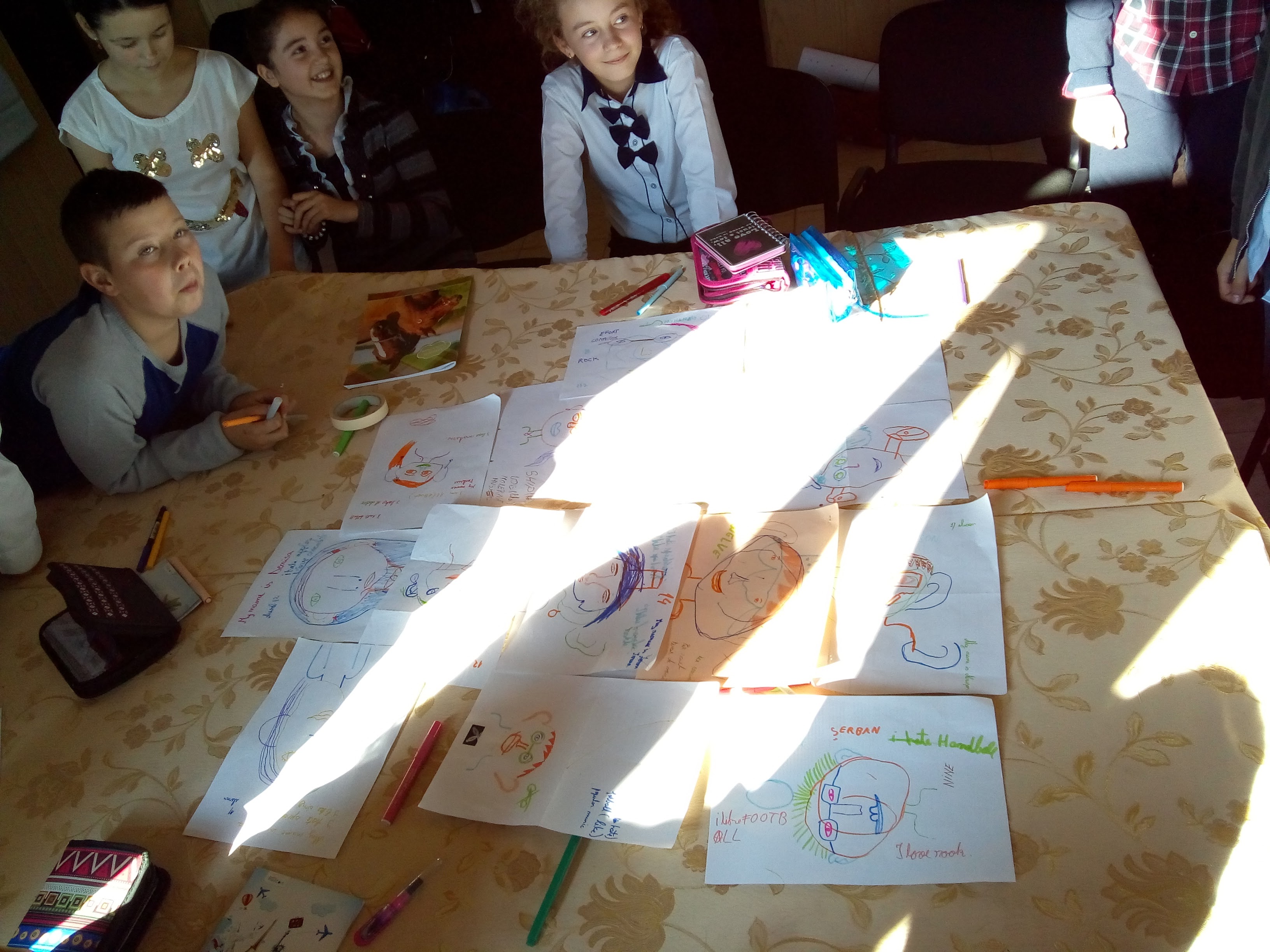 În fiecare miercuri, puțin înainte de ora două îmi iau cartonașele, creioanele, jocurile și foile de flipchart. Fac o scurtă plimbare de la Curba de Cultură la Biblioteca Izvoarele, găzduită de Centrul Cultural, mut câteva scaune și mese, îmi aranjez lucrurile și apoi îmi recapitulez mental planul zilei.
În fiecare miercuri, puțin înainte de ora două îmi iau cartonașele, creioanele, jocurile și foile de flipchart. Fac o scurtă plimbare de la Curba de Cultură la Biblioteca Izvoarele, găzduită de Centrul Cultural, mut câteva scaune și mese, îmi aranjez lucrurile și apoi îmi recapitulez mental planul zilei.
Când se face două încep să văd mici (și nu chiar așa mici) figuri îmbrăcate în straturi calduroase fugind de la școală la lecția de engleză. Toți se adună împrejurul meu în încăpere și încearcă din răsputeri să nu vorbească română când vor să mă salute și să mă întebe ce mai fac. Oricum ei sunt mult mai puțin confuzi când vorbesc engleză decât sunt eu când aud vorbindu-se română! Apoi petrecem o oră învățând engleză împreună prin jocuri și activități al căror rol este să ajute participanții să îți îmbunătășească abilitățile de vorbire și înțelegere ale limbii engleze.
Sunt totdeauna impresionată de efortul și atenția pe care ei o depun în timpul pe care îl petrecem împreună. Nu prea contează cât de prost mi-a mers în ziua respectivă, când am lecție cu ei am cea mai bună dispoziție. Fie că primesc flori, feedback pozitiv ori o mulțime de îmbrățișări, aceste mici semne de recunoștință mă fac foarte fericită să fiu profesor în România!
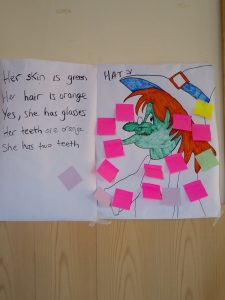
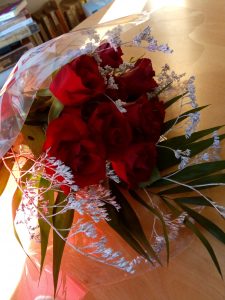
Héloïse este în România pentru o perioadă de nouă luni, din septembrie 2017 până în mai 2018, în cadrul proiectului EVS20: Let’s Move and Change [2016-3-FR02-KA105-012345] proiect co-finanțat de Uniunea Europeană prin Programul Erasmus+ și implementat în România de către Curba de Cultură.
Adventures with the minibus in Izvoarele
Coming from a capital such as Madrid and not having a driving license, it was normal that I was quite concerned about the public transport. But things are different now in Izvoarele. It is a small place, so the public transport is reduced with a strict schedule (and sometimes a bit random). The first thing I asked Sorin was “Where are the public transport schedules and the bus and train stops?”, so he showed me the paper schedule that is in the office.
Venind dintr-o capitală precum Madrid și fără un permis de conducere, era normal să fiu destul de îngrijorată de transportul public. Dar lucrurile sunt diferite în Izvoarele. E un loc mic, prin urmare transportul public este redus și cu un orar strict (dar câteodată la întâmplare). primul lucru pe care l-am întrebat pe Sorin a fost “Unde găsesc orar autobuzelor, precum și stațiile de autobuz și tren?” iar el mi-a arătat orarul lipit pe perete în birou.
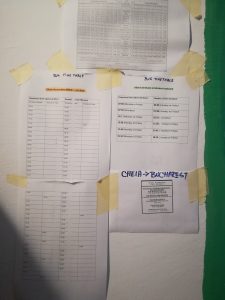
The first day that I had to use the public transport was to go from Schiulesti to Curba the Cultura, and it was so confusing for me. Isabella and I were together, so at least we had some fun with our confusion. Estelle drove us until Homoraciu bus stop, and we just had to take one bus to arrive at Curba de Cultura.
În prima zi în care am folosit transportul în comun am mers din Schiulești către Curba de Cultură și a fost puțin confuzant. Eram cu Isabella așa că cel puțin ne-am distrat. Estelle ne-a dus cu mașina până la Homorâciu în stație și de acolo aveam de luat un singur autobuz pentru a ajunge la Curba de Cultură.
We got into the van that said “Valenii de Munte – Maneciu” (also the ones which go to Bucuresti, Ploiesti or Cheia). We saw through the window the Amo Pensiunea, then Curba de Cultura, and when we were approaching the church, our stop, we had a small problem: “How do we get out of the bus?” None of the passengers wanted to get out in Izvoarele stop, so they did not move. “Ok. So… we just passed our stop… now what? There is not a stop button or something?”, and yes, Isabella and I get out of the bus in Maneciu. We were so lost that we even had to call Kristina. Somehow, we managed to get the bus from Maneciu and to get out in Izvoarele. We discover that if you want to get out, you have to stand up inside the van (but sometimes it does not work and the driver passes the stops, somehow we ended up once in Malu Vanat).
Am urcat în microbuz ce avea scris “Valenii de Munte – Maneciu” (același care vine de la București, Ploiești spre Cheia). Am văzut pe geam pensiunea Amo, apoi Curba de Cultură și când ne apropiam de biserică unde e stația, am avut o problemă: “Cum coborâm?” Nici unul dintre pasageri nu cobora acolo, deci nu s-au mișcat. “Ok… așa am ratat coborârea… și acum ce facem? Nu există vreun buton de stop ori ceva?” așa se face că eu și Isabella am coborât în Măneciu. ne pierduserăm așadar am sunat-o pe Kristina. cumva am reușit să luăm alt microbuz din Măneciu și să coborâm la Izvoarele. Am descoperit că pentru a coborî trebuie să te ridici în picioare (dar nici așa nu funcționează întotdeauna și odată am coborât în Malu Vânăt.
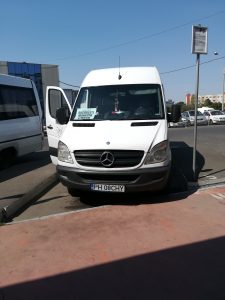
But we also met some funny drivers and had funny moments. One of them made a joke on me! I got into the van; showed him my monthly ticket, and then he took it and… made a movement of throwing it through the window!! There is another driver, “our driver” that we almost meet him every time we go by bus. He lives also in Schiulesti, and one day, we were waiting for the bus to return from Curba (and no bus came from the schedule)… I saw him driving the van and raised my hand to stop him; we got inside the van and showed him my ticket, but he rejected it… He was just returning home from his work and took us for free to almost our home! He is really nice!
Însă am întâlnit și șoferi amuzanți și am avut momente amuzante. Unul dintre ei mi-a jucat o farsă! Am urcat în microbuz, i-am arătat abonamentul, l-a luat și s-a prefăcut să îl aruncă pe geam!!! Apoi un alt șofer, “șoferul nostru” pe care îl întâlnim aproape de fiecare dată. El loicuiește de asemenea în Schiulești și într-o bună zi în timp ce așteptam autobuzul să ne întoarcem de la Curbă (nici nu autobuz nu venea conform orarului)… l-am văzut conducând, i-am făcut cu mâna și a oprit. I-am arătat abonamentul dar l-a respins… El doar se întoarcea acasă de la muncă și ne-a dus și pe noi gratuit până aproape acasă! Este foarte drăguț.
Alba este în România pentru o perioadă de 12 luni, din iunie 2017 până în mai 2018, în cadrul proiectului Izvoarele Unveiled [2016-3-RO01-KA105-035584] proiect co-finanțat de Uniunea Europeană prin Programul Erasmus+ și implementat în România de către Curba de Cultură.